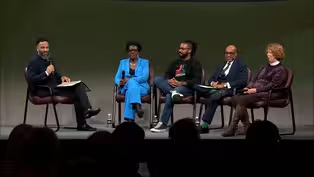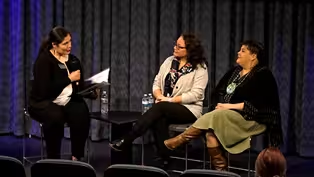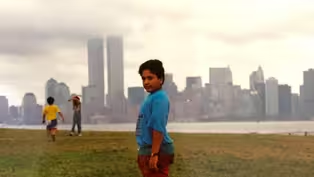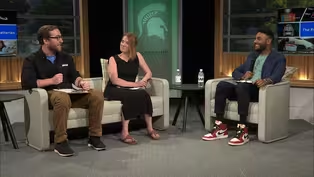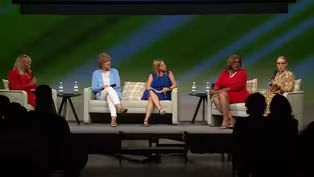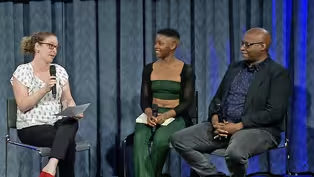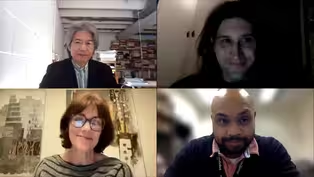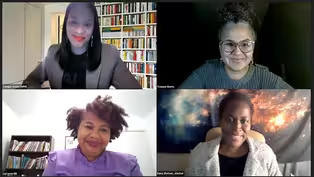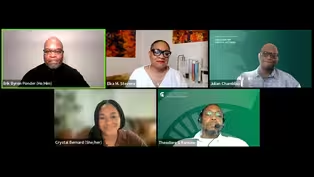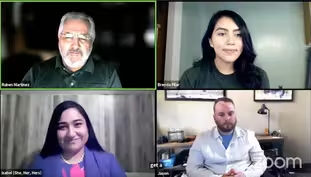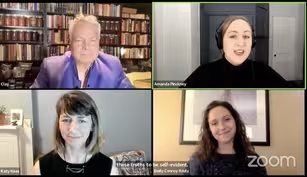
Panel Q & A – First Voice Generation
Special | 31m 2sVideo has Closed Captions
Panel discussion following the film First Voice Generation.
Panel discussion following the film First Voice Generation. With moderator Emily Sorroche, associate director of DEI in CANR; and panelists Cynthia Martinez, producer; Nayeli Mora, film protagonist; and Gael Figueroa-Enriquez, film protagonist. Recorded 9/28/23.
Problems playing video? | Closed Captioning Feedback
Problems playing video? | Closed Captioning Feedback
WKAR Specials is a local public television program presented by WKAR

Panel Q & A – First Voice Generation
Special | 31m 2sVideo has Closed Captions
Panel discussion following the film First Voice Generation. With moderator Emily Sorroche, associate director of DEI in CANR; and panelists Cynthia Martinez, producer; Nayeli Mora, film protagonist; and Gael Figueroa-Enriquez, film protagonist. Recorded 9/28/23.
Problems playing video? | Closed Captioning Feedback
How to Watch WKAR Specials
WKAR Specials is available to stream on pbs.org and the free PBS App, available on iPhone, Apple TV, Android TV, Android smartphones, Amazon Fire TV, Amazon Fire Tablet, Roku, Samsung Smart TV, and Vizio.
More from This Collection
Panel discussions following WKAR film screenings. Featuring filmmakers, policy makers, community partners and more.
Panel Q & A - The Cost of Inheritance
Video has Closed Captions
Panel discussion following the film The Cost of Inheritance. (30m 59s)
Video has Closed Captions
Panel discussion following the film Warrior Lawyers. (33m 42s)
Video has Closed Captions
Panel following the film "American Jedi." Discussion features the film’s producers. (48m 46s)
Panel Q & A – NOVA Science Studio Showcase
Video has Closed Captions
WKAR showcases highlights from the NOVA Science Studio project. (53m 35s)
Panel Q & A – Building the Reading Brain
Video has Closed Captions
Panel discussion following the WKAR original film, Building the Reading Brain. (36m)
Video has Closed Captions
Panel discussion following the film Afrofantastic. Featuring filmmaker Julian Chambliss (29m 6s)
Panel Q & A – Free Chol Soo Lee
Video has Closed Captions
Panel discussion following the film Free Chol Soo Lee. (29m 48s)
Panel Q & A - Storming Caesars Palace
Video has Closed Captions
Panel discussion following the film Storming Caesars Palace (25m 19s)
Video has Closed Captions
Panel discussion following the episode Afrofuturism, from the Artbound series (33m 56s)
Panel Q&A - Brenda's Story: From Undocumented to Documented
Video has Closed Captions
Panel discussion following the film Brenda's Story (25m 44s)
Panel Q & A - Benjamin Franklin
Video has Closed Captions
Panel discussion following the film Benjamin Franklin. (21m 46s)
Video has Closed Captions
Panel discussion following the film Unadopted. (31m 45s)
Providing Support for PBS.org
Learn Moreabout PBS online sponsorshipAll right.
Thank you all for your patience with us.
I just want to start off by saying, just like Nayelis mom said, So I want something real quick, just for audience sake and participation.
How many of you are first generation?
Oh, I'm going to cry.
If this film can not remind us of our own journeys, I'm not sure what will.
So thank you for that.
Oh, for me?
For taking us down memory lane.
But sometimes I like to joke and say, Don't make me a moderator.
Facilitator with documentaries because I'm a crier.
So.
But here we are.
Before we get started with our conversation, I want to introduce our facilitator and also thank the College of Agriculture Natural Resources for thinking of us too, for partnering up with this film.
So it's my pleasure to introduce Dr. Emily Sorroche.
She's the associate director of the College of Agriculture Natural Resources, Office of Diversity, Equity and Inclusion in this role.
So she works to create to promote professional development programs that emphasize diversity, equity and inclusion, as well as develop training tools to empower supervisors and administrators to evaluate and reward diversity and inclusion capacity.
She also provides regular educational and networking opportunities for graduate students, faculty and staff to connect with affinity groups around equity and inclusion issues and maintains relationships with relevant university encounter officers and partners previously.
Sorroche worked at the Office of Management Positions at MSU, so we'll welcome Emily and then go from there.
Thank you.
Thank you so much, Amanda.
And thank you to WKAR and the team for the collaboration.
We have three panelists with us tonight and I would like to start by introducing Cynthia Martinez.
Cynthia Martinez.
second generation Mexican American, born into a working class family in Holland, Michigan.
She is a mother, a writer, producer and filmmaker.
A graduate of Western Michigan University, she set out to work and realize she had stories to tell.
With that passion, she enrolled in Columbia University's Graduate School of Journalism and completed her master's degree in 2012.
Her experience includes working for Univision News in Miami and currently engaged with directing and producing films and media that advocate social justice.
Next, we have Marlee Mora, Naomi Morales, a third year graduate student, third year student at Grand Valley State University, majoring in political science with a minor in Spanish and aspires to be a lawyer.
Last week.
I forget a lot in regards.
Gael Figueroa-Enriquez is a second year student at Hope College, majoring in art studio with a minor in environmental studies or Science geology, and aspires to be a photographer Filmmaker.
Welcome.
Thank you.
So we had the the little green sheets.
So if you haven't given those seats to Emily or if you start to have questions, that's a resource for you to get those questions up here to me.
Okay.
So I'd like to start out with Cynthia, a question with the first question.
What inspired you to make the documentary First Generation, The First Voice Generation, and what were your main goals in making this film?
Well, I'm the granddaughter of Mexican migrant farmworkers.
I am the daughter to two teenage parents who are actually in the room tonight.
They came here from Holland to support me and the students here.
And after you hear my voice, the beginning of the film, after I graduate from high school and college, I left the community because, you know, like you said, I hadn't felt like I belonged.
And I just wanted to to try living in different cities and and experience different culture.
And in my coming and then I'll just fast forward to after graduate school came back to Holland during the global pandemic and kind of felt a little lost.
I just had my first child and, you know, just had this moment where I was trying to figure out what my purpose was in being back in Holland.
And I wanted to use my education and my passion for telling stories to give back to students in the Holland community that could relate to the same things that I had gone through 20 years ago.
So it's sort of a love letter to myself bringing, but also through the lens of these young people that you've seen.
But it was through my own personal story and struggle of generational poverty growing up in Holland and wanting to give a voice back to my younger self.
Yeah, I'm creating awareness for first gen students.
Thank you.
Yeah.
And at least one the movie in the storytelling.
So thank you for that.
The second question I have, we can start with Nayeli and then Gael and then Cynthia over the final piece.
One of the themes in the film is the struggle for identity and belonging.
How did you how did participating in the documentary change your lived experience and or your sense of belonging in college?
I, I think definitely being in the documentary gave me a lot of motivation, if anything, because I feel like somebody recognized me as more than just an average student because I felt like I was an average student.
But in reality, we're working twice as hard to get half as far.
I mean, not knowing the language.
Feeling left out at school and even to this day at my university, I feel like I'm still working on my identity and working on who I am and working on feeling like bringing out the most authentic version of myself and my culture in my university.
But I think it definitely gave me the strength that I didn't have in high school middle school years.
And I think that's something that was built through the documentary.
I think also just through Cynthia.
She's a great motivator.
She's a great mentor.
I think she really inspired me and she she listened to what I had to say.
And I think that was one of the biggest things I had never had anybody be like, Hey, you, what you're seeing is like going to help other kids.
And I'm like, Really?
And she's like, There's other kids like you and everybody.
I've gone through this myself, and I think that really inspired me in college to try and open up more and say what's on my mind and see what I've been through and see what, you know, The firsthand experience is.
Yeah, I would have to agree.
When we first started the documentary, I was a completely different person, both in every aspect.
I had to lower a lot of my walls and protection that I had built over the years and really expose myself to be able to share my story and with the documentary, I soon realized that my story wasn't just my story.
It's the story of all not just Latino, but firsthand students in general.
And I've highlighted this before, but this documentary served as a way for not just our story to be shared, but also for others to realize that we all have pretty similar backgrounds and struggles that we face on a daily basis.
And I think prior to this film, I was very was trying on sharing that part of my life because I thought for so long it was just myself.
And now I have the privilege and opportunity to be able to meet others who share that same identity as me.
And I'm more than grateful for that.
And yeah, if anything, to follow up with.
No, go ahead.
Go ahead with that.
Yeah.
Okay.
So I'd like to entertain if there's any audience questions.
Oh, don't be shy.
I have some swag, some t shirts from the film.
So there's a segment in the film that Gael talks about the graphic of the pandemic of the roller coaster.
And we actually when we were doing fundraising for the film, we had T-shirts made.
So whoever was going to answer or ask the first question will get a T-shirt.
Anyone want a T-shirt?
Yes.
Do the surveys you said you used to help them out a lot and they relied on you.
So I'm just wondering, you know, how was our relationship like now that you're in college?
Do do they still rely on you a lot?
I moved back home, so I'm a very nosey sister.
I think actually my relationship with my siblings is probably one of the relationships I appreciate most in life.
I saw this like posts recently that it's like our parents, you know, like, you know, leave us.
Eventually our partners come too late in life, but our siblings are forever.
And I think that sticks with me, my relationship with my brothers, even my older brother.
I think it's I'm really involved in their lives.
I try to be I try to motivate them.
I try to inspire them.
My brother struggles like my older brother.
I don't know if you saw him.
He's well, he's not older, but my middle brother, he's in high school right now.
He's a junior in high school and he struggled a lot his first two years.
I mean, after the pandemic, we all struggled like you saw in the film.
But my brother, more than anyone, especially having our parents go through a divorce on a child, I feel like that affects them a lot more.
And I always I've always been very involved in their lives in school.
I mean, just yesterday I was doing division with my little brother, the one that you the mud guy, you know.
So I think just I really am very involved in their lives because I don't want them to feel the way I do.
I try to give them, you know, pieces of advice.
I mean, my brother struggled for his first two years of high school and he had no he was he didn't even want to go to college.
And now he's on the varsity soccer team.
He wants to go to college.
He's planning to go to Jersey and honestly go me going to college affect them negatively because I feel like I was away from home.
And like I said, I've always been like the other parent.
I've kind of, you know, it's my mom and me.
Those are their parents because my dad's not very involved.
So I think like my brother went into a very bad depression those first two years I were gone while I was gone, which were his first two years of high school, and he did horribly see, I can't see it any other way.
And now that I'm back home, he sees what I do and he wants to do what I do.
He's like, You go to school, you work.
He's like, You're building a life for yourself.
I'm like, You can do the same thing.
So if anything, I think it will.
It hurt them a lot that I moved away from home.
I mean, us Hispanic families are very, very tight knit.
So when one leaves, it's it's really bad.
Even my self struggle, my first two years of college, when I moved away from home, I lost a lot of weight.
I became really depressed.
I got a lot of like mental health issues, just, you know, not being near my family.
So I moved back to finish off two years and I think it's definitely motivated me more.
My family is just something that inspires me and helps me grow.
I mean, I know that you have to leave the nest eventually, right?
But something about my family's does they motivate me more than anything.
They don't hold me back.
They don't tell me to stay.
I if I came back, it's because I wanted to.
And I think that's something that like I definitely recognize going to college that I like being in a family setting.
I like, you know, my family, my brother is it's something that I just don't want to get rid of quite yet.
Not yet.
Thank you for that question.
Okay.
Any others.
Using the celebrity to murder or help.
Somebody else in college or even in.
Your high schools?
Yes, I definitely have tried to.
Not much as much as on tech talk, but I do want to I have actually my mom's told me to begin talking about the film a little bit more.
And I've just been thinking of ways to integrate that.
I think the main thing on my page is mostly like my culture promoting that and definitely inspiring students.
Definitely.
And Instagram is where I post more about the documentary and people ask me all the time, I mean, especially like younger kids.
I know some of the younger kids in Upward Bound would always ask me, like, text me, hey, like, how do I apply for a scholarship?
The use of the program programs going on right now.
I still go back, I still help out.
I still help them write essays.
I think it's a way for me to like because I want kids to succeed.
I feel like there's nothing better than being a and and being able to help and lead in a position that you've already been.
So I definitely do try to use and I want to use my especially my take talk more to inspire other Latino first and students with this documentary.
So can you repeat that question?
I think I hear you.
Do celebrities have to reach back and help others?
You know, you're a role model for.
And I think I I didn't realize how much impact I actually had until, you know, I'm sitting right here right now.
So I often say I'm just a student.
You know, I'm just a kid.
And I realize that I well, I didn't get to realize how much of an impact it was actually having on people until they would come up to me and be like, Hey, I saw your film.
And it just really hit my soul.
Or like, it really resonated with me and I just for the longest, you know, I just was able to share my story.
And building off of that, I now advocate more than I ever have for just other students in general, for instance.
And anybody that's struggling in general, you know, as a student, if things come up, hardships and challenges.
And I just want to make sure that everybody around me or that comes to me knows that they're not alone in this.
And, you know, recently more of my peers back at Hope have been coming up to me since like this, worried about the film over there.
And it's just so interesting because they genuinely are like asking these questions.
And now I fit in that role of answering them and, you know, motivating them to like, you know, not just go watch the film, but actually carry a message after that that is able to spread in that, you know, just beyond Hollywood.
And I'm glad that we started that.
Yes.
How was the production process?
How did you find the story?
And also, how was it with without recording?
Like, did you work as a team?
Everything we can up.
And then I'm going to try to be as quick about explaining that because it's quite a journey.
This is a three year project and even for that documentary film can take up to ten years.
It's very cathartic, quite a process.
So at that time that I moved back to Holland and I had just had a child, I didn't have a camera equipment or anything.
Like I ended up just contacting the Upward Bound program because I had seen in the news what how the education system was being impacted nationally.
And so I as a journalist, right, I was looking at how that was impacting my local community.
So I got in touch with the upper bound program because I am a true Upward Bound alumna.
And I contacted the directors and just basically sort of pitched this idea of, I want to know what your students are going through.
Would you be okay with me documenting some of them?
And they're of course a little hesitant, but they've known me since I was a child, so they agreed.
They trusted me.
I'll just put that first.
Trust, I think has been a big part of this all along the way being that I am from the community, being that I did know how the upper bound program worked.
Originally, the program gave me certain students.
I didn't realize that you actually cast for film.
Again, I'm a journalist that made 2 to 3 minute news pieces.
I had never made a film before, so it wasn't until like two months later, after I filming all of these students and then like, found them in the pack of.
And that's a whole other story of how I found these two.
There was like 80 students in the program, the parent giving me originally four, and I was following them and everything.
But it's one thing to like create a relationship and I feel like I'm a pretty easy person to talk to.
Right?
Right.
I feel like, yes, but but, you know, these are teenagers.
These are minors that I was talking to.
You put a camera.
I can you can have a conversation with them, turn a camera on and put that camera in front of their face.
And that changes everything.
So some of the students I was working with, you know, I was doing the stories with them, but it would change sometimes a little bit when I put the camera on.
And then, of course, we were in the middle of a pandemic.
So sometimes the families were okay with me coming in the home and sometimes they weren't.
When I connected with with these two and Angel I, the journalism teacher who you saw at the beginning, had I when I interviewed her, she was one of the first people I interviewed for the project.
And I said, Who in your journalism class is the most vocal?
And she said, Angel, of course, and Gaia.
And so that's how I came to them.
So it was that was more organic.
It wasn't the original people that the that the program had given me.
And then how I came to Nyali was I also volunteer and do work with the program and they set us up to do mock interviews.
So basically you pretend to be an employer and they give you a set of students and you interview them.
And so I got matched with this lovely young lady who loves to talk and of course wants to be a lawyer.
So I had to pretend I had my own law firm and interview her.
And I mean, I was blown away just by her presence.
I mean, she had her blazer, her hair was all done.
She was ready with her pen and her laptop and just very professional presence.
And then she just started talking when I asked questions.
And I had never seen that much confidence from a 16 year old and thinking, Wow, you're how old are you again?
Yeah.
And I and then I was like, Do you know that I'm doing this document?
And remember, everybody was meeting virtual, so it was really hard to connect with everybody.
The group, the classes were all online.
So I ended up just saying to her, Hey, how would you would you be okay?
Can you go ask your mom?
Literally, she got it from the camera, from the interview and asked her mom if I could come and interview her.
And she was.
Yeah.
If you're going to come, you better come tomorrow because we're leaving to Mexico.
And I was like, I will be there.
I will be there.
So I initially went to go the next day to your home and I spent a whole hour just doing an introduction sort of interview, getting to know her and her mom.
And they were just really natural and open to me being in their home.
And I felt that way through the entire process with with them and Kyle's family the same.
You know, I'm a little sad that, like, not every student's story could have been in this film.
There were seven students that I followed pretty closely, but we only see the three that are in the film.
And even then there is hours and hours of footage, even from their stories that didn't even make it in this.
So I guess that sort of gives you a process.
And then I realized how expensive this was.
I started out the project self-funding, and I realized once I had all this footage that and and how they trusted me with their stories, that I wanted to do the process right.
And I knew that I needed an editor with professional year long experiences of editing films.
And so that's how I came to working with attorney Melissa Stern, who's from Chicago.
But in order for her to work with her is a lot of money.
When she told me how much she cost, I was like, Oh, okay, never mind.
And and she, you know, she kind of left the conversation, but then, like contacted me a week or like a week later through email and said, you know, I'm really interested in working with you on this project.
It sounds amazing to me.
And I said, I got to be honest, when you shared with me how much you cost, I can't afford you.
And so she goes, okay, well, you know, if you have some sample footage of what you're doing, I'd be happy to just consult on it, you know?
And then if you get some money, I'm willing to maybe work with you at a discounted rate.
She's like, I'm really interested in in the story.
And then I went and started a Kickstarter that sprang a Kickstarter crowdfunding campaign and raised $50,000 in 30 days.
And that was took a lot of work even prior to doing that.
And that was an emotional run.
And like I said, we were giving these T-shirts away that Gail had designed as like a prize that you could get if you made a certain donation.
And then with that money, basically, I was able to hire the editor, Melissa.
And that sort of started the journey of really putting the film and really making it a professional piece of what you see here.
And then I was able to get a grant from an organization called Women of Color Give in Holland.
I pitched for that.
I had to prepare pitching.
So I've applied for grants.
There's just so many other things behind the scenes that in putting something like this together, I don't think people realize, and nor that, nor did I realize.
And so and even in this process now, it's like I had a director producer and now it's like marketing campaign and impact campaign and just reaching out to people like you.
I just think how I met you.
Do forgive me your name.
I feel Dillon.
Dillon.
And I totally forgot.
I just met them in Holland at a baby christening that I was at last week.
And we just started talking and they're like, We live in Lansing, like, Oh, here's my flier, come to my film.
And we were in Holland and like, You guys are here, so thank you for coming out.
So it's just making connections with people and just telling them and creating awareness.
So a lot of what I do is very grassroots and quite a process.
So I hope that answers your question.
Wow, Thank you.
That's so amazing.
We got a few questions here from the audience that I'll start with.
So this question is for Gael.
How is your experience at Holland College?
Have you found a community that supports you there?
To clarify, I hope you're okay.
No, no, you're totally fine.
It is Holland College.
It really is.
No, no.
Jokes aside, um, yeah.
I mean, I was fortunate enough to join this program called the Film Scholars Program, and within that program, it's for students that are from different ethnic and racial backgrounds to all live in one dorm hall together.
So my first freshman year was very much a unique experience in which most of my friends were international students, and then others living on my floor were primarily like from other ethnic backgrounds.
So it was pretty, pretty good up until the the only issue with that is with on campus is if we have all the minorities together, that's great for the first year, but what are you going to do for the rest of the three years when you're out of that building?
Right.
You got to socialize with the rest of the campus, which is still 90% white.
Now I'm just playing.
Is it is.
It is.
And I'm not I'm not playing.
It is so there is a community because we are growing in every single aspect, but it takes time.
I've been fortunate enough to try to involve myself in different organizations such as like the L.A.
So which is the Latino student organization on campus, and I'm on the privilege of being the social outreach chair on the e board.
So constantly I'm trying to reach out to new students every single week, not just Latino students, but in general, students that seem to, you know, need somebody there to have and to know that there's things to do on campus.
So, yeah, I've been fortunate enough to find my people and I hope to just be the same for whoever comes next.
Thank you.
Okay, the next one here.
What was your personal motivation to tell your part of this story and what is the best way to view and support this film following tonight's screening?
Sure.
What was your personal motivation to tell you were part of this story?
Definitely.
That I never felt heard, that I never felt like I was like I belong the imposter syndrome, Like a lot of the time.
Like I'm not supposed to be here.
Definitely just wanting to be like, this is what's going on.
Like, people don't understand what's going on in our community.
Like we don't feel right.
Like, yes, we're here.
Yes, we have good grades, but we don't feel part of anything.
We feel discriminated against.
We feel like alone.
I felt very lonely.
I mean, like I had to hide my culture.
I had to hide who I was, my language, everything, my brother, so that he didn't speak Spanish.
He wasn't Mexican, he was English.
He used to say when he was younger because he felt so ashamed of being Mexican.
So it was definitely that passion that I'm like where we we I'm like, This is where my family's from.
I can't lose that.
I was like, Why am I going to hide it?
And my family obviously is one of my biggest inspirations.
My mom, more than anything, wanting to give her everything that I didn't have.
I mean, they came to this country, so my mom always wanted to go to school.
She always wanted to study, she always wanted to go to university, but she couldn't y she was in Mexico.
She came here at 18, had a child at 18.
And it's like, I want to do that for her because she supports me in every way that she possibly can to help me be what she couldn't have.
And just if people just, you know, promoting this documentary, I mean, this is everyone's story.
Like El said, it's our story.
It's not just my story or girls or Your Angel.
So it's the story of first and students of Latino student.
And I think just, you know, any time there's a screening, anytime there's a chance to share, it is that you should be able to because then it's one more person that gets to really or one more person that gets to watch or one more person that gets to learn from this.
So I think that's really important.
Yeah, I agree with me, it was quite a little different.
I mean, when Cynthia had asked me to to film me, I didn't really realize if I had a story right.
I was just a very, like she said, very talkative.
And I was able to be comfortable in front of the camera and share my life.
And in the moment I didn't realize how much of an impact that would have, but entirely it was just let me show how I spend my daily life and be able to film that.
And throughout the process you realize, okay, maybe, maybe some of the stuff I'm going through isn't as normal as I once thought.
Like the conversation I had with my sister about that one phrase If you ain't touch, you ain't much for all my time.
And I'll even say in the documentary, I wasn't that aware of how implemented they had been in my life.
I just thought of it as another experience.
So I've been able to grow and realize I guess my story is important, but it's not just my story as a story as as I always said, it's the story of every single other student that's been there with me since day one.
We all are going through it.
And I just had the opportunity to share that and I'm really grateful for that.
So in return, all I ask is that when you guys come out of here tonight, you know, to spread the word, say that this film exists because the more people know about it, the more even if it's just a, you know, a post or a comment or telling somebody else, hey, this I just saw this film and it had opened my eyes to this and point of view.
That's fine.
That's more than funny.
Just being able to share that this film exists is what we are trying to do, because whatever, it doesn't matter if there's only two or 100 people in here.
This story, this is film is important and we got to share that.
One of my biggest motivators is representation.
You know, I grew up in Holland during the eighties and nineties.
It has become more inclusive and diverse, but it wasn't always didn't feel that way when I was a child.
And the if you ain't Dutch, you ain't much I like truly believed that as a child, and I really did not feel like I belonged unless I was in my Dutch costume every everyday.
And I know that might be a little bit different for you guys, because even in talking, even when I went to your schools, I'm like, Oh my gosh, like, it's so much more diverse here than it was when I was at West on public schools.
But, you know, they actually had middle school teacher there, asked me to come and speak to the video production classes this past week, and she brought out the yearbooks from like 1995.
And I was like, beat that.
And I quickly looked for myself in the pages.
And and I remember distinctly in the seventh grade being the only brown girl on the basketball team.
And and it wasn't only just being the only brown girl, it was being the only one that couldn't afford the basketball shoes that everybody else had on the team.
So it was being brown and it was being a different socio economic background.
So those were all things that I was very aware of.
And so in visiting the class, you know, and I and I really admire this teacher, she's been such a, an advocate of the film and she's white, right?
And she she's just been so sweet and an ally.
She's like, I recognize that we need more teachers that look like the students in the school.
Like, I want to help with that, you know?
And it's great to even see Caucasian white teachers like that that see that and know that and know that that is what's going to help create change within the schools and help, you know, social mobility within our communities and within this country.
And so that's one of my biggest motivators in getting this film out and sort of an inspiration to to helping first gen So and in my community.
So thank you so much.
Well, I think that is all the time we have for tonight.
And I just want to say thank you so much to our panelists and for sharing your story and for spending time with us tonight.
And thank you all for joining us for the first voice generation presented by the College of AG and Natural Resources and WKRN.
Events like this from WKRN made possible with the support from people like you and for those who have donated to our.
So thank you and good night.
Support for PBS provided by:
WKAR Specials is a local public television program presented by WKAR
